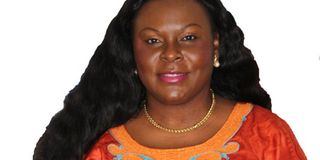Parliament vital in achieving SDGs and 2030 Agenda

Mediator. UN Resident coordinator in Uganda Rosa Malango
What you need to know:
We invite the Parliament of Uganda, as an institution of democracy, to uphold the rule of law and exercise commitment in reducing corruption in all its forms as part of its efforts to promote accountability, efficiency and transparency in government.
The day presents an opportunity for nations to evaluate their performance in meeting the principles of democracy as articulated in the Inter-Parliamentary Union’s Universal Declaration on Democracy.
On September 15, Uganda joined the rest of the world to commemorate the International Day of Democracy. Endorsed by a UN resolution in 2007, this day is meant to celebrate and review the state of democracy in the world and continue to perfect its’ application for the benefit of all humanity.
The day presents an opportunity for nations to evaluate their performance in meeting the principles of democracy as articulated in the Inter-Parliamentary Union’s Universal Declaration on Democracy.
Key is the importance of the universality and common values, upholding dignity and fundamental rights for all, sustained cohesion, genuine partnership between women and men in the conduct of society’s affairs, free political competition; open and non-discriminatory participation, primacy and observance of the rule of law and the exercise of human rights.
These principles are a key anchor for Agenda 2030 and its 17 Sustainable Development Goals (SDGs). Hence this year’s theme: “Democracy and the 2030 Agenda for Sustainable Development.
There are several definitions of democracy, but I will use one shared by Mahatma Gandhi, which says; “I understand democracy as something that gives the weak the same chance as the strong.” Democracy is, therefore, as much a process as it is a goal. It is only with the full support of governments, national governing institutions like Parliament, civil society and citizens that the ideals of democracy can become a reality.
In Uganda, this is reflected through a Parliament that has representation from every county, that includes women representatives from all districts as well as special groups such as youth, disabled and workers among others.
These positive efforts towards holistic representation are commendable and for voters, they are a way of getting quality services to local communities. Elected leaders should, therefore, ensure that their positions translate into better policies, services, livelihoods and dignity for all the people of Uganda.
In addition, Uganda’s decentralised system of governance enables representation, participation and decision making by citizens from the Local council one at village level, through to Local council five at district level. However, a number of analytical studies have outlined the exorbitant cost of democracy in Uganda. It is, therefore, critical for us to examine how cost effective the current structure of democracy is and whether it will enable the country to attain middle income status by 2040.
The 2030 Agenda for Sustainable Development, is a plan for achieving a better future for all. At the heart of the plan are 17 SDGs and 169 targets. The plan calls for mobilising efforts; to end all forms of poverty, fight inequalities and tackle climate change, while ensuring that no one is left behind. It focuses on achieving the ‘Five Ps’- People, Planet, Prosperity, Peace, and Partnership.
Progress has already been made in the right direction, with the SDGs currently integrated into national planning frameworks such as the second National Development Plan, making Uganda one of the first countries globally to achieve this. Uganda was also able to hold one of the first meetings on domestic financing for Agenda 2030.
Civil Society is also leading the process of taking the goals to the people through the Tondeka Mabega (Leave No One Behind) campaign led by the NGO Forum.
As the central institution of democracy, Parliament embodies the will of the people. Parliamentarians are the citizens’ eyes, ears and voice - when they execute their mandate, they nurture the country’s democracy.
UN Secretary-General Ban Ki-moon, speaking at the Inter-Parliamentary Union’s Fourth World Conference of Speakers of Parliament last year, informed Parliamentarians, “People will look to you to hold your governments accountable for achieving the goals, and to write the laws and invest in the programmes that will make them a reality.”
Parliament, therefore, has a critical role to undertake - of translating the SDGs into concrete action. This can be achieved through the following:
• Enacting legislation that helps the nation to deliver on the SDGs in areas such as access to justice, health, education and the protection of women and children;
• Passing budgets that allocate resources to SDG targets and related programmes;
• Scrutinising government policies and international treaties submitted for consideration, to ensure that they are SDG compliant;
• Demanding for accountability and plugging leakages in public spending to ensure funds are used efficiently to deliver on the SDGs; and
• Providing purposeful oversight and monitoring of government in the implementation and reporting on the SDGs.
Forums such as the recently instituted Parliamentary Forum on SDGs will be key in building and maintaining the momentum to follow through on the delivery of the SDGs.
UNDP and the entire UN family in Uganda remains committed to working with Parliament and all Ugandans to meet the 2030 Agenda and its targets.
We invite the Parliament of Uganda, as an institution of democracy, to uphold the rule of law and exercise commitment in reducing corruption in all its forms as part of its efforts to promote accountability, efficiency and transparency in government.
This is how we can ensure that no one is left behind!
Ms Malango is the UN Resident Coordinator/ UNDP Resident Representative




